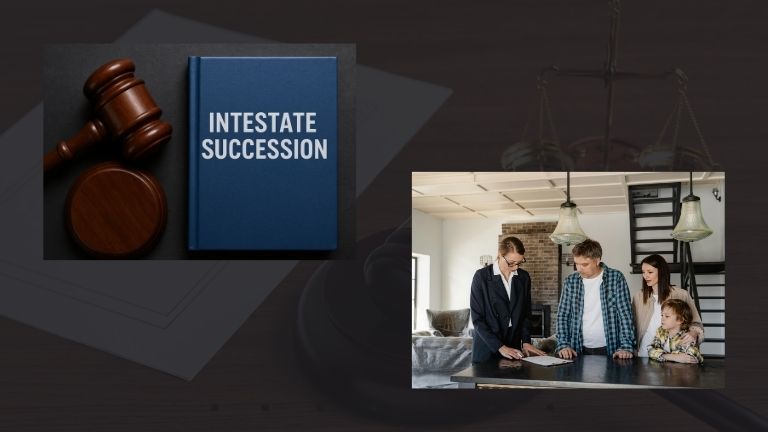
Death is uncertain, and no one knows what can happen in the next moment. Most people believe they will live until old age, which is why they do not prepare for the time after death, such as making a property will, sharing bank balance details, or informing family members about their assets. Even elders sometimes do not take care of creating a will for their property and other liquid assets in the name of their children or other family members. This article offers a clear explanation of intestacy laws in Massachusetts for readers who may be unfamiliar with estate procedures.
Intestate Succession Massachusetts: How Property Is Distributed When There Is No Will
When someone passes away without a valid will, their property does not simply disappear or get divided randomly among their family members. If there is no proper property will, it can sometimes create disputes and conflicts within the family. This process, known as intestate succession, ensures that a person’s estate is distributed according to established rules. For families dealing with the loss of a loved one, understanding how these laws work can bring clarity and prevent unnecessary conflict.
What Does It Mean to Die Intestate?
Dying intestate means a person did not leave a legally valid will. Without instructions from the deceased, the state follows default rules to determine who receives the estate.
Assets Affected by Intestacy
Not all assets go through intestate succession. The rules apply only to property that would normally pass through a will, usually assets owned solely by the deceased. Examples include:
- Solely owned real estate
- Bank accounts without named beneficiaries
- Personal property (furniture, jewelry, vehicles)
Certain assets pass automatically by law and are not part of an intestate distribution, such as:
- Life insurance proceeds with named beneficiaries
- Joint accounts with rights of survivorship
- Retirement accounts with beneficiary designations
- Property owned jointly with another person
Understanding this distinction helps clarify what the court will and will not distribute under intestate rules.
How Intestate Succession in Massachusetts Determines Heirs
Massachusetts uses a clear hierarchy that prioritizes close relatives. Who inherits and how much depends on which family members survive the deceased.
Spouse and Descendants
The spouse’s inheritance varies based on whether the deceased had children and whether those children were from the same relationship.
If the Deceased Had No Children
The surviving spouse generally inherits the entire estate.
If All Children Are Shared With the Surviving Spouse
The spouse typically inherits everything, reflecting the assumption that children of the same marriage will eventually inherit from that spouse.
If the Deceased Had Children From Another Relationship
In blended families, the spouse and children share the estate. The spouse receives a set portion plus a specific dollar amount, and the remainder goes to the children.
No Spouse, But Children Survive
If the deceased leaves children but no spouse, the children inherit the estate in equal shares. If a child passed away before the parent but left children of their own, those grandchildren inherit their parent’s share.
What Happens When There are No Immediate Family Members?
If the deceased had no spouse or descendants, the law moves down the family tree.
Parents
If one or both parents are alive, they inherit the entire estate.
Siblings
If the parents have passed away, siblings inherit next. If a sibling has passed away but left children, nieces and nephews may inherit their parent’s share.
Extended Relatives
If no close relatives exist, the estate may go to:
- Grandparents
- Aunts and uncles
- Cousins
The law follows a specific pattern, always prioritizing closer relatives before moving outward.
When No Relatives Can Be Found
If truly no relatives exist, the estate goes to the Commonwealth of Massachusetts. This is rare and typically occurs only after exhaustive attempts to locate family members.
The Role of Probate Court
Even without a will, estates must go through probate, a legal process that oversees the distribution of property.
Appointment of a Personal Representative
A personal representative (also called an administrator) is appointed to:
- Gather the deceased’s assets
- Pay debts and taxes
- Distribute the remaining property
If there is no will naming an executor, the court selects a representative, often a spouse or close family member.
Handling Debts and Taxes
Before heirs receive anything, the personal representative must address:
- Outstanding debts
- Funeral expenses
- Taxes
- Claims from creditors
Only after these responsibilities are completed can distribution occur.
Special Considerations in Intestate Succession, Massachusetts
While the general rules are straightforward, certain circumstances require additional attention.
Half-Siblings
Massachusetts treats half-siblings the same as full siblings for inheritance purposes unless specific evidence suggests otherwise.
Stepchildren
Stepchildren do not inherit under intestacy unless legally adopted. This can create complications in blended families.
Adoption
Legally adopted children inherit exactly as biological children do.
Common-Law Marriage
Massachusetts does not recognize common-law marriage. Partners must be legally married to inherit under intestacy.
Property Outside Massachusetts
If the deceased owned real estate in another state, distribution of that property follows the laws of that state, not Massachusetts.
For further reading, the Massachusetts Legislature (General Laws Chapter 190B) provides access to the full statutory language governing intestate succession.
Why Understanding Intestacy Matters
Even families who expect straightforward outcomes may find surprises when intestacy laws apply. Key reasons to understand these rules include:
Preventing Family Disputes
Clear knowledge of legal rules can help avoid disagreements among relatives, especially during emotional periods.
Identifying Who Needs Legal Support
Some estates are simple, but others involve complex relationships, blended families, or property in multiple jurisdictions.
Encouraging Estate Planning
Learning how intestacy works often motivates individuals to create wills, powers of attorney, or trusts to ensure their wishes are followed.
In the last,
In Massachusetts, when a person dies without creating a will, their property is distributed according to state intestate succession laws to their family members, who are prioritized as follows: the surviving spouse, children, and parents. If there is a spouse and no descendants or parents, the spouse inherits everything. If there are descendants, the spouse inherits the first $100,000 and half of the rest of the estate, while the descendants inherit the other half. If there are children but no spouse, the children inherit everything equally. Understanding the basics of intestate succession Massachusetts helps families navigate the probate process more confidently and make informed decisions during challenging times.


